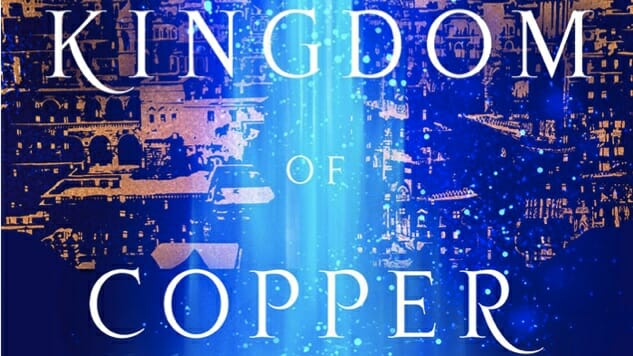Middle Eastern Mythology and Palace Intrigue Come to Life in S.A. Chakraborty’s The Kingdom of Copper

S.A. Chakraborty’s debut novel The City of Brass demonstrated that the mythology of the Middle East is just as fertile ground as European folklore—if not more so—for fantasy literature. The djinn, ifrit, ghouls, marid, peri, rukh, karkadann, shedu and nasnas of Islamic, Zoroastrianism and pre-Islamic folklore take the places of elves, wizards and goblins. It’s an enthralling twist on the tale of a young protagonist with powers she never knew she had discovering a world a magic she never knew existed; Nahri is a con artist on the streets of Cairo when she accidentally summons the legendary djinn warrior Darayavahoush and discovers her royal lineage in the magical city of Daevabad.
 While The City of Brass introduced the fraught politics of the djinn, its sequel The Kingdom of Copper tackles the millennia of war crimes and betrayals through its three point-of-view characters—all wanting the best for their city and all harboring their own resentments and doubts. The Daeva, headed by the royal Nahid family, built and ruled the city, persecuting the shafit—human-djinn mixbloods—with cruel disdain. The Nahids were violently overthrown by the other djinn tribes, led by the Geziri, in retribution for the treatment of the shafit. But the Daevabad that Nahri—the sole surviving Nahid—finds is ruled by the iron-fisted Ghassan al Qahtani, who has little regard for the shafit living in squalor. (Spoilers for The City of Brass ahead.)
While The City of Brass introduced the fraught politics of the djinn, its sequel The Kingdom of Copper tackles the millennia of war crimes and betrayals through its three point-of-view characters—all wanting the best for their city and all harboring their own resentments and doubts. The Daeva, headed by the royal Nahid family, built and ruled the city, persecuting the shafit—human-djinn mixbloods—with cruel disdain. The Nahids were violently overthrown by the other djinn tribes, led by the Geziri, in retribution for the treatment of the shafit. But the Daevabad that Nahri—the sole surviving Nahid—finds is ruled by the iron-fisted Ghassan al Qahtani, who has little regard for the shafit living in squalor. (Spoilers for The City of Brass ahead.)
-

-

-

-

- Curated Home Page Articles By Test Admin October 21, 2025 | 3:10pm
-

- Curated Home Page Articles By Test Admin October 21, 2025 | 2:57pm
- Urls By Test Admin October 21, 2025 | 2:57pm
- Curated Home Page Articles By Test Admin October 21, 2025 | 2:55pm
-

-

-

-

-

-

-

-

-

-

-

-

-

-

-

-

-

-

-

-

-

-

-

-

-

-

-

-

-

-

-




































